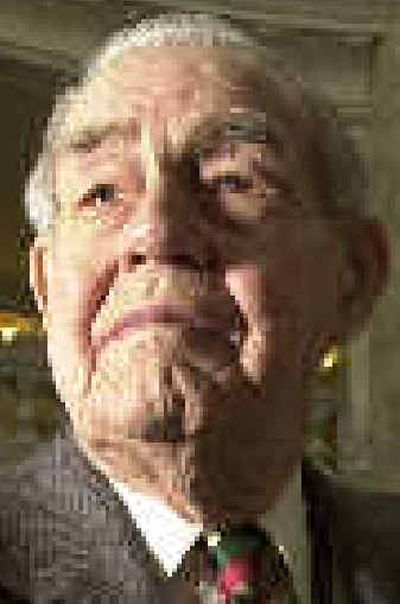Former Gov. Smylie dies at 89

BOISE, Idaho – Robert Smylie, the only man elected to three consecutive terms as governor of Idaho, died early Saturday morning at his home. He was 89.
Smylie had recently struggled with pneumonia and suffered from several illnesses including emphysema, cancer and congestive heart failure, his son, state Rep. Steve Smylie, said.
“He has always been my hero,” Steve Smylie said. “I think the thing that he is most proud of is the fact that he did what was right for the state of Idaho. There was never a scandal. Agree or disagree with him, he was a man of tremendous integrity.”
It was Robert Smylie’s decision to embrace the imposition of a sales tax in 1965 that enabled the tax’s key legislative advocates to round up the votes needed for passage.
In his autobiography, “Governor Smylie Remembers,” published in 1998, Smylie wrote that his support for the 3-cent tax was probably a major factor in his upset defeat in the Republican primary a year later to then-state Sen. Don Samuelson.
Still he called it the most important legislative act in the state’s first century, creating what policy-makers now fondly refer to as Idaho’s three-legged stool of income, property and sales taxes. “Its passage marked a defining moment in the state’s struggle toward political and economic maturity,” Smylie wrote in the book.
Current Idaho Gov. Dirk Kempthorne ordered that flags at state buildings be flown at half-staff in honor of Smylie and asked Idaho residents to join him in praying for Smylie’s family.
He said arrangements were being made for official state ceremonies to remember Smylie.
“Governor Smylie was a staunch advocate for his positions, even after he left office. He remained active and wrote about public policy well into his later years,” Kempthorne said. “Generations of Idahoans’ lives have been enriched by Robert and Lucille Smylie’s deep love for the arts and for Governor Smylie’s passion for the outdoors as he established the Idaho State Parks Department. Our state parks will continue as a living tribute to Governor Smylie’s legacy.”
Smylie was a powerful leader, former Gov. Phil Batt said. Batt remembered that as a freshman legislator, he was persuaded by Smylie to change a vote in support of one of his projects.
“Bob Smiley was one of a kind. He was unique, a very forceful governor who had a clear vision for what he wanted and knew how to get it,” Batt said.
Smylie was born in Marcus, Iowa, in 1914 and saw Idaho for the first time as a student at the College of Idaho in Caldwell. He graduated in 1938 and then pursued a law degree at George Washington University in Washington, D.C. With his degree in hand, he spent World War II in the Coast Guard and then married before returning to Idaho in 1947 to become a deputy state attorney general.
That November, he was appointed attorney general by Gov. C.A. Robins to replace Robert Ailshie, who had died eight days earlier. Smylie was elected to a full four-year term in 1950 and mounted his first successful campaign for governor four years later.
In addition to enactment of the sales tax in the final years of his three terms, Smylie’s administration saw an increase in the minimum wage, institution of the five-day work week for state employees, an extensive highway construction program and the establishment of the state park system.
Ironically, it was Smylie who recruited Samuelson into politics, convincing the Sandpoint businessman to run for the state Senate in 1960. Six years later, Samuelson blindsided Smylie and denied him a fourth term.
Because of his role in helping moderate Republicans nationally regroup after the defeat of Barry Goldwater in the 1964 presidential election, Smylie was mentioned as a possible vice presidential nominee in 1968. His ouster as governor in 1966 killed that talk.
Three years later, President Richard Nixon wanted to appoint Smylie chairman of the Advisory Commission on Intergovernmental Relations, a group Smylie was instrumental in founding, and Samuelson refused to sign off.
After the Statehouse, Smylie won a number of corporate and consulting jobs. In 1981, Smylie wrote, he realized he was becoming too fond of alcohol. He checked into a Nampa care center, joined Alcoholics Anonymous and did not have a drink after that.
Smylie also played an active role in higher education, serving on the Board of Trustees at Albertson College of Idaho.